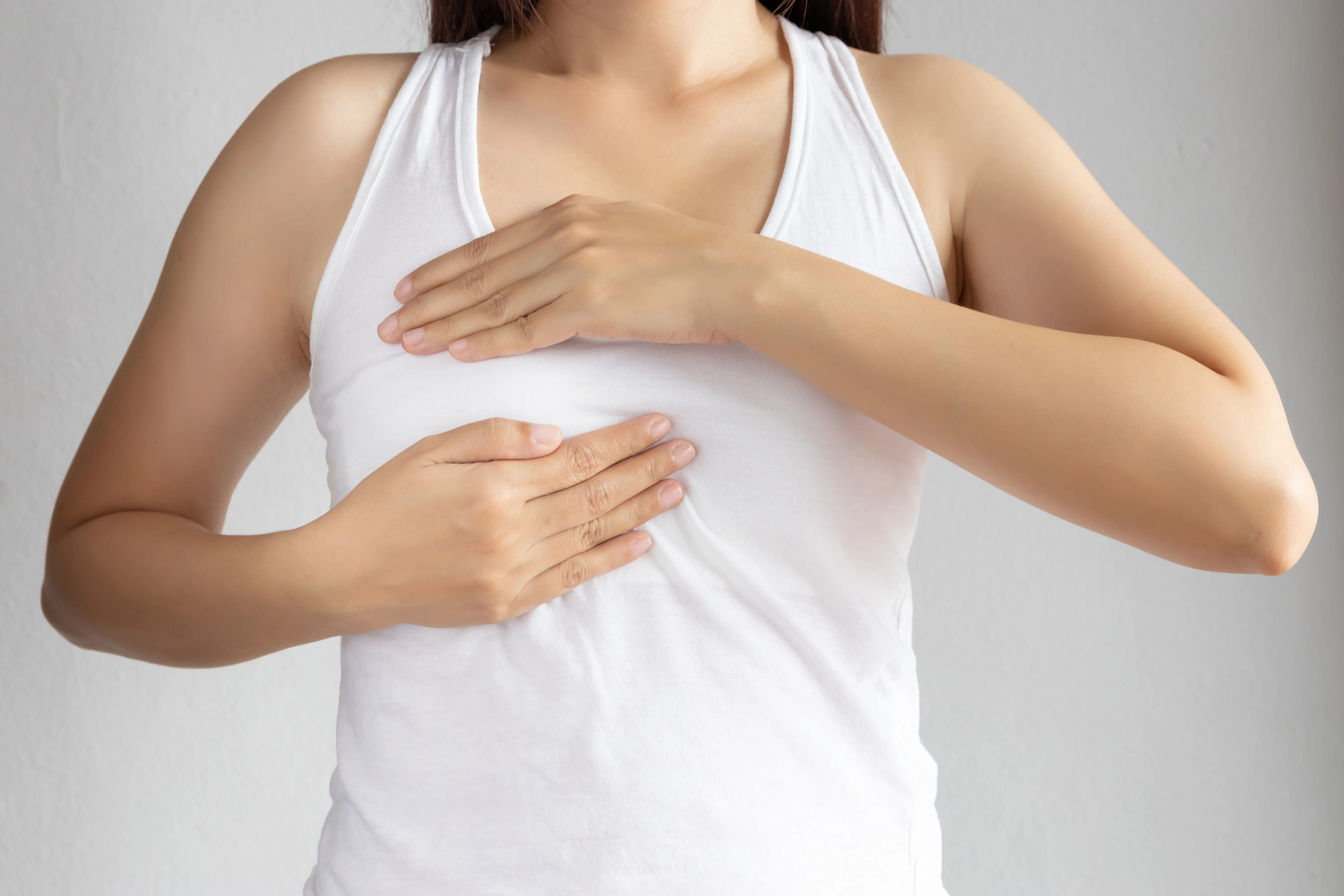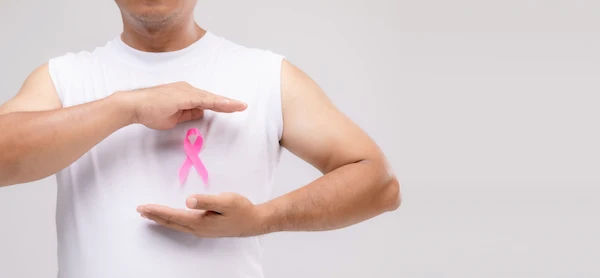Guide to Risk Factors Of Breast Cancer The Ones You Can Control
Learn about the risk factors for breast cancer you can change. Our guide explores how lifestyle choices like diet, exercise, and alcohol consumption can influence your risk and offers actionable steps to help reduce it.

.webp?tr=q-80,f-webp,w-350,dpr-2,c-at_max 700w)
Introduction
Hearing the words "breast cancer" and "risk factors" together can feel overwhelming. It often brings to mind scary statistics and things beyond our control, like family history. But here’s the empowering truth: while some risk factors are fixed, many of the most significant ones are directly influenced by our daily choices. This guide shifts the focus from fear to action. We will walk through the science of breast cancer risk, clearly separating the factors you cannot change from the powerful, modifiable ones you can. By understanding how lifestyle choices like diet, exercise, and alcohol consumption impact your risk, you can create a practical, proactive plan for your long-term breast health. Think of this not as a list of restrictions, but as a roadmap to empowerment, giving you the knowledge to take charge of your well-being.
Understanding Breast Cancer Risk: What Does "Risk Factor" Really Mean?
Before we dive in, it's crucial to understand what a "risk factor" is. A risk factor is anything that increases your chance of getting a disease. However, having one or even several risk factors does not mean you will definitely get breast cancer. Many women with risk factors never develop the disease, and some women who do get breast cancer have no known risk factors besides being a woman and getting older. It's about probability, not certainty.
The Difference Between Relative Risk and Absolute Risk
You'll often see risk presented in two ways. Relative risk compares the risk between two groups (e.g., "women who drink alcohol have a 20% higher risk than those who don't"). This can sound alarming. Absolute risk, however, looks at the actual chance of something happening over a certain period. For example, a 20% relative increase might mean the absolute risk goes from 12% to 14%—a much smaller-sounding number. Keeping this distinction in mind helps put risk information into a less frightening perspective.
Consult Top Specialists
The Unchangeable: Acknowledging the Risk Factors You Can't Control
It's important to acknowledge the factors you cannot change. Understanding these helps you and your doctor assess your baseline risk and determine the right screening schedule for you.
Age, Gender, and Family History
The strongest risk factors are simply being a woman and getting older. Most breast cancers are found in women aged 50 and older. A family history of breast or ovarian cancer, especially in a first-degree relative (mother, sister, daughter), also increases risk.
Genetic Mutations: BRCA1 and BRCA2
Inherited mutations in genes like BRCA1 and BRCA2 significantly increase the risk of both breast and ovarian cancer. However, it's important to note that these account for only about 5-10% of all breast cancers.
Dense Breast Tissue and Reproductive History
Women with dense breast tissue (having more glandular and fibrous tissue than fatty tissue) have a higher risk. Dense tissue can also make mammograms harder to read. Starting your period before age 12 or beginning menopause after age 55 also slightly increases risk due to a longer lifetime exposure to hormones.
Taking Charge: The Powerful Risk Factors You Can Influence
Now, let’s focus on the empowering part. Research suggests that a substantial portion of breast cancers could be prevented through lifestyle changes. These factors are within your power to modify, offering a real sense of agency over your health.
Lifestyle Factor #1: Alcohol Consumption and Your Breast Health
The link between alcohol and breast cancer is one of the most well-established in cancer research. Studies consistently show that the more alcohol a woman drinks, the higher her risk of breast cancer.
How Alcohol Affects Estrogen Levels
Alcohol can increase levels of estrogen and other hormones associated with hormone-receptor-positive breast cancer. It may also damage DNA in cells, leading to cancerous changes. The American Cancer Society recommends that women who drink alcohol limit their consumption to no more than one drink per day.
Practical Tips for Reducing Your Alcohol Intake
You don't necessarily have to quit entirely. Start by designating alcohol-free days each week. When you do drink, opt for smaller measures and alternate alcoholic drinks with water. Exploring delicious non-alcoholic alternatives like sparkling juices or craft mocktails can make reduction easier and more enjoyable.
Lifestyle Factor #2: The Critical Link Between Weight, Exercise, and Cancer
Maintaining a healthy weight and staying physically active are cornerstones of reducing breast cancer risk, especially after menopause.
The Role of Body Fat and Estrogen Production After Menopause
Before menopause, most estrogen is produced by the ovaries. After menopause, when the ovaries stop producing estrogen, the main source becomes body fat. Being overweight or obese means more estrogen is circulating in your body, which can fuel the growth of certain breast cancers.
How Regular Physical Activity Lowers Risk
Exercise helps by regulating hormones, boosting the immune system, and helping you maintain a healthy weight. Aim for at least 150 minutes of moderate-intensity exercise (like brisk walking) or 75 minutes of vigorous activity (like running) each week. Even small amounts of activity can make a difference, making lifestyle changes to prevent breast cancer accessible to everyone.
Lifestyle Factor #3: Smoking and Exposure to Environmental Risks
Smoking is a well-known cause of many cancers, and growing evidence links it to a higher risk of breast cancer, particularly in premenopausal women. The chemicals in tobacco smoke can damage DNA, including in breast cells. Avoiding smoking and secondhand smoke is a critical step. While research is ongoing, it's also wise to be mindful of prolonged exposure to certain chemicals found in some workplaces and pesticides.
Reproductive and Hormonal Choices Within Your Control
Certain life choices related to reproduction and hormone use can influence risk.
The Impact of Having Children Later in Life or Not At All
Women who have no children or who have their first child after age 30 have a slightly higher risk. The reason may be related to the number of menstrual cycles a woman has over her lifetime.
Understanding the Risks and Benefits of Hormone Therapy
Using combined hormone therapy (estrogen and progesterone) after menopause for more than three to five years increases the risk of breast cancer. If you are considering HRT to manage menopausal symptoms, it's essential to discuss the risks of HRT and breast cancer with your doctor and use the lowest effective dose for the shortest possible time.
The Link Between Oral Contraceptives and Slight Risk Increase
Current or recent use of birth control pills is associated with a slight increase in risk, which disappears after stopping use for about 10 years.
The Power of Diet: Can What You Eat Prevent Breast Cancer?
While no single food is a magic bullet, an overall healthy diet is a key part of a preventable cause of breast cancer strategy.
The Mediterranean Diet: A Promising Approach
Studies suggest that a Mediterranean-style diet—rich in fruits, vegetables, whole grains, legumes, nuts, fish, and olive oil—may help protect against breast cancer. Its anti-inflammatory and antioxidant properties are believed to be key.
Foods to Embrace and Foods to Limit
Focus on a plant-forward plate. Embrace colorful vegetables and fruits, fiber-rich whole grains, and lean proteins. Limit processed meats, sugary drinks, and highly processed foods. While the evidence for specific foods like soy is complex, current research indicates that whole soy foods (like tofu and edamame) are safe and may even be protective.
Beyond Lifestyle: The Importance of Proactive Health Screening
While not a "risk factor" you control, your approach to screening is a powerful act of prevention.
Knowing Your Body: The Role of Self-Exams
Being familiar with how your breasts normally look and feel can help you notice any changes. Report any changes like a new lump, dimpling, nipple discharge, or skin changes to your doctor promptly.
Clinical Breast Exams and Mammograms
Follow the screening guidelines recommended by your doctor based on your personal risk. For women of average risk, this typically involves regular mammograms starting at age 40 or 50. If you notice any persistent changes in your breast health, it's crucial to consult a doctor. You can book a quick online consultation with a specialist on Apollo24|7 to discuss your concerns and determine the next steps.
Quick Takeaways: Your Action Plan for Risk Reduction
- Limit Alcohol: Stick to no more than one drink per day, or consider eliminating it.
- Move Your Body: Aim for at least 150 minutes of moderate exercise weekly.
- Maintain a Healthy Weight: Focus on a balanced diet and regular activity, especially after menopause.
- Don't Smoke: Avoid tobacco in all forms.
- Eat a Plant-Forward Diet: Prioritize fruits, vegetables, and whole grains.
- Discuss Hormone Therapy: Use HRT at the lowest dose for the shortest time possible.
- Stay Proactive with Screening: Know your body and follow recommended mammogram schedules.
Conclusion
Understanding your cancer risk factors is the first step toward taking control of your health. While we can't change our genes or age, we have significant power over our daily habits. This guide has highlighted that choices around alcohol, physical activity, weight management, and diet are not just about general wellness—they are direct, evidence-based strategies for reducing breast cancer risk. View these not as burdensome rules, but as positive investments in your long-term well-being. Start with one or two changes, and build from there. Remember, if you have concerns about your personal risk based on family history or other factors, the best course of action is to speak with a healthcare professional who can provide personalized guidance.
Consult Top Specialists
Consult Top Specialists

Dr. Syed Ismail Ali
General Practitioner
7 Years • MBBS
Hyderabad
Apollo 24|7 Clinic, Hyderabad

Dr. Harshendra Jaiswal
General Physician/ Internal Medicine Specialist
12 Years • MBBS , MD (General medicine)
Kolkata
108 DHANA DHANVANTARI Clinic, Kolkata
(25+ Patients)

Dr. Vivek D
General Physician
4 Years • MBBS
Bengaluru
PRESTIGE SHANTHINIKETAN - SOCIETY CLINIC, Bengaluru

Dr. Anand Ravi
General Physician
2 Years • MBBS
Bengaluru
PRESTIGE SHANTHINIKETAN - SOCIETY CLINIC, Bengaluru

Dr Syed Mateen Pasha
General Physician
2 Years • MBBS
Bengaluru
PRESTIGE SHANTHINIKETAN - SOCIETY CLINIC, Bengaluru
Consult Top Specialists

Dr. Syed Ismail Ali
General Practitioner
7 Years • MBBS
Hyderabad
Apollo 24|7 Clinic, Hyderabad

Dr. Harshendra Jaiswal
General Physician/ Internal Medicine Specialist
12 Years • MBBS , MD (General medicine)
Kolkata
108 DHANA DHANVANTARI Clinic, Kolkata
(25+ Patients)

Dr. Vivek D
General Physician
4 Years • MBBS
Bengaluru
PRESTIGE SHANTHINIKETAN - SOCIETY CLINIC, Bengaluru

Dr. Anand Ravi
General Physician
2 Years • MBBS
Bengaluru
PRESTIGE SHANTHINIKETAN - SOCIETY CLINIC, Bengaluru

Dr Syed Mateen Pasha
General Physician
2 Years • MBBS
Bengaluru
PRESTIGE SHANTHINIKETAN - SOCIETY CLINIC, Bengaluru
More articles from Breast Cancer
Frequently Asked Questions
What is the single most important lifestyle change I can make to reduce my risk?
There's no single answer, but combining regular physical activity with maintaining a healthy weight is incredibly powerful. These two factors work together to regulate hormones and reduce inflammation, which are key drivers of breast cancer risk.
If I have a family history of breast cancer, do lifestyle changes even matter?
Absolutely. While you cannot change your genetics, lifestyle factors still play a critical role. For women with a higher genetic risk, healthy choices are even more important, as they can help offset some of that inherited risk and contribute to overall better health.
I drink a glass of wine every night. How much does that really increase my risk?
Research shows that even light drinking (less than one drink per day) can slightly increase risk. The key is moderation. If you have other risk factors, it may be worth discussing with your doctor whether reducing or eliminating alcohol is a prudent step for you.
Are there any specific vitamins or supplements that can prevent breast cancer?
No supplement has been proven to prevent breast cancer. In fact, some high-dose supplements may be harmful. It's always better to focus on getting nutrients from a balanced diet rich in whole foods rather than relying on pills.
How soon after making lifestyle changes will my risk decrease?
The protective effects build over time. Your body benefits from healthy habits immediately, but the significant impact on cancer risk reduction is seen over many years and decades of consistent practice. It's a marathon, not a sprint.




.webp)